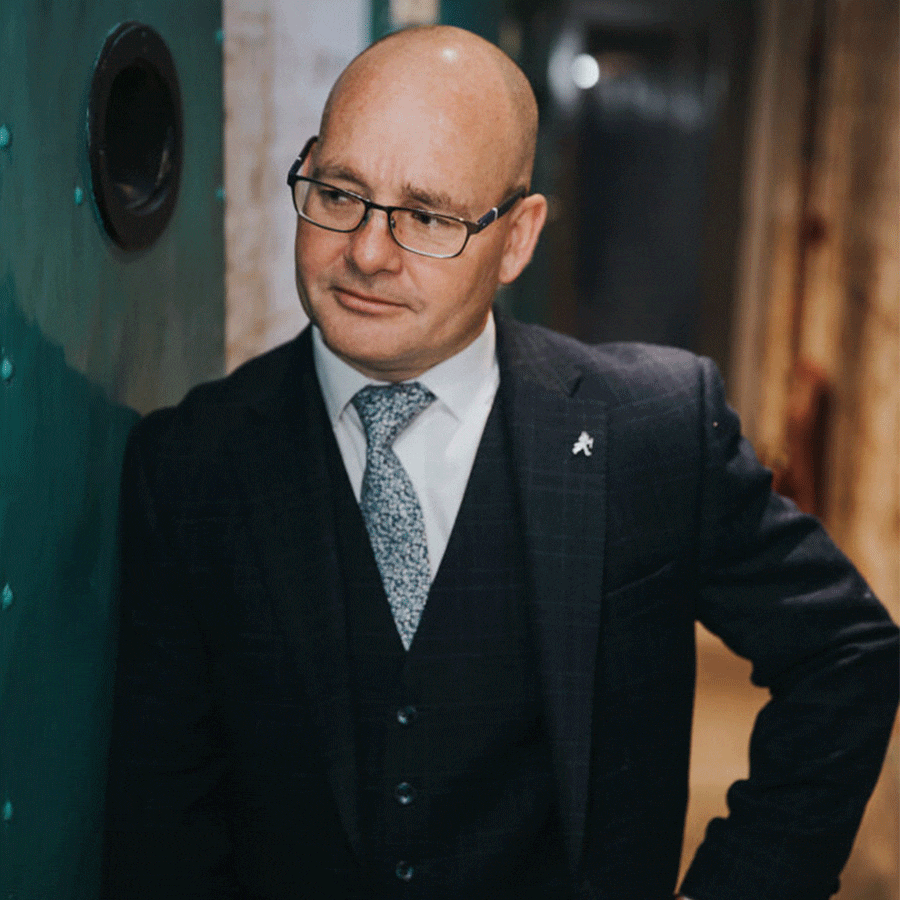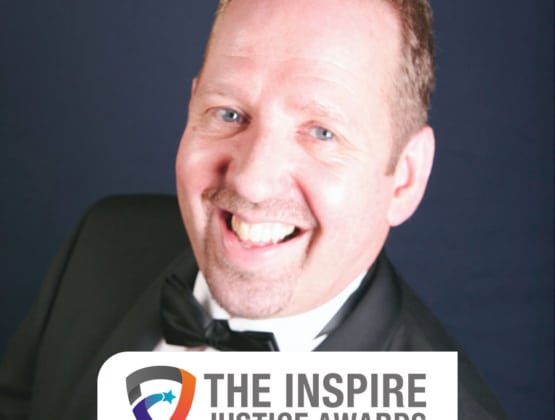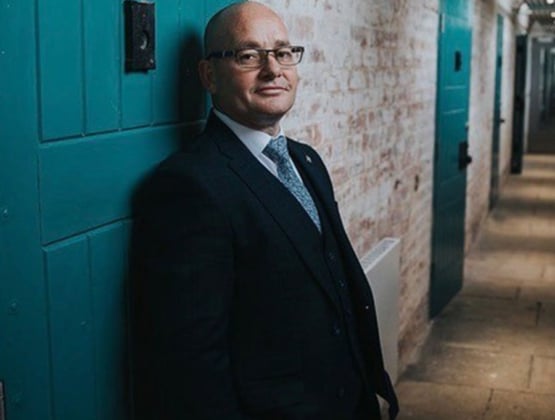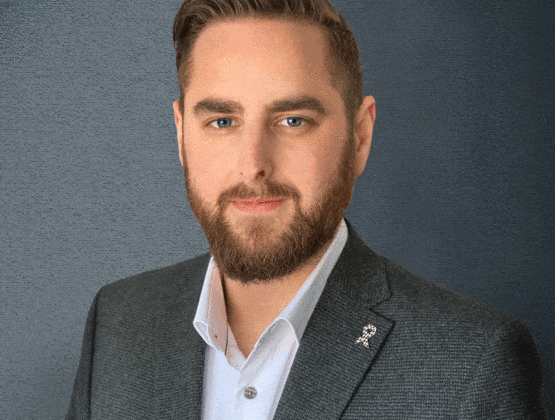Published by Skills for Justice
Unlocking Potential’s Gethin Jones on how the justice sector workforce helped him turn his life around
Date 24.11.22

“It wasn’t the system that rehabilitated me but the individuals that work within it,” – Unlocking Potential’s Gethin Jones on how the justice sector workforce helped him turn his life around.
Dominic Louks, Product Marketing Manager at Skills for Justice, met with Gethin Jones, Founder at Unlocking Potential prior to the awards to learn a little more about his experiences of the justice system, how the staff roles we are celebrating here today helped turned his life around, and what the future holds for Unlocking Potential.
DL: Tell me a bit about your background and your own personal experiences of the justice system?
I’ll do the shortened version, but I’ve got 51 years’ experience of the system. What I mean by that is I was born into the system. My mum was a care leaver and so social services were there from the day I was born. Growing up in a very dysfunctional family meant I did not get the love, care or nurturing I needed as a young child, and this came out in my behavior later on in life. From a very young age I was labelled and targeted and
nobody ever really looked at the cause and because I wasn’t happy at home, I wasn’t happy at school. I didn’t really achieve in school and started to cultivate negative relationships within my community from that point. And this led me to get involved in the police at the tender age of 11 when I got my first ever criminal conviction.
DL: What level of crime were you committing at this age and how did this spiral into your adult life?
I was spending time on the streets, starting to experiment with substances and alcohol, getting into trouble, vandalising and shoplifting before I was locked up in a detention centre two weeks after my 14th birthday. After that I went on what I would describe as a 20-year self-destruct mission. In and out of remand homes and secure units I became a dependent heroin user on the streets, breaking into cars, shop burglary, before spending time in prison for intent to supply Class A drugs.
DL: What aspects did you find most difficult when readjusting back to society and civilian life?
Everything was a struggle for me. When I left prison and I was required to volunteer, it was the most uncomfortable two hours of my week. All I knew what to talk about was prison, drugs and crime. These people were talking about mortgages, holidays, growing fruit and veg – I had no idea how to engage with these people. I’d never had a bank account, never held a tenancy and didn’t understand the world that was being presented to me.
DL: Do you think the system has got better in terms of helping those leaving prison to readjust to the outside world?
The truthful answer is no. The reality is most people are spending 80% of their time feeding the bureaucratic machine and only 20% of their time is actually working with the people that need the help and support. What I do trust is individuals that work within the system, turning up every single day, with unmanageable caseloads trying to help that person make a difference and change. The willingness of the people that want to help is really there, but we need to look at the system that stops them from being able to do it. I actually feel lucky that on my release from prison there was a whole load of funding in relation to drug treatment and testing and rehabilitation centres. If I was coming out today, wanting to change, and the level of change that I had to do, would I succeed? Probably not.
DL: What have you learnt from working with police, probation and prison staff over the years?
I’ve met some of the best people that work within the prison system – some of these people are absolutely phenomenal. There is a greater awareness and understanding of the need to work in a trauma-informed way. These people in the system have a lot of pain and that is what is driving their behaviour, and we need to understand the pain. We can make the changes and I do think we’re on a kind of a cusp.
DL: So, tell us a bit about Unlocking Potential. What brought you to setting up this organisation? How did that come about?
I felt I was a good leader. When I was in children’s homes, I used to get kicked out by leading kids astray, so knew I had influence and a transferable skill! I realised there was something more that I wanted to do and when working for a local authority we had a seconded prison officer (John Bolderson). One day we were chatting, and he said he’s thinking of leaving the Prison Service. He said people just don’t change and he keeps seeing the same people over and over again. I said the truth of the matter is you don’t see the successes back in prison because they don’t come back through the gate. So that’s where the idea came from. I wanted to go around prisons and show officers and other staff the impact and value that they can have when they create a human relationship with somebody.
DL: In a nutshell what is the mission and purpose of Unlocking Potential and how do you help those working in the justice sector and offenders?
I always recall what a prison governor told me and that is if somebody goes to prison once or twice, that person needs to acknowledge what it is that they have done wrong and look to themselves as to what needs to change. But if somebody’s coming back to prison for six, seven or eight times, as a system, we need to acknowledge what it is that we’re doing wrong and what it is that we need to change, because we can’t keep punishing them because we’re missing something. I like to think that’s what we’re about, being part of that missing gap, developing the relationships and supporting the areas that nurture and support change.
DL: You are going to deliver a keynote at the Inspire Justice Awards. Do you feel these type of award programmes are important for recognising the efforts of our wider justice workforce?
Absolutely. It wasn’t the system that rehabilitated me but the individuals that work within it, and they played a huge part in my journey, and other people’s journeys and it needs to be celebrated. It goes back to when I spoke about John Bolderson; he was about to leave the service because he didn’t feel valued. And his employer didn’t see the benefit of what it was that he did, so I want to help amplify the message that these non-frontline roles can and do help, and you’re needed probably more now than ever before.
DL: What does the future hold for you and Unlocking Potential? Where would you like to see yourself and your business in five years?
On a micro-level I really want to be able to create an infrastructure of people that will be able to work on the frontline and help people that need it right now. On a macro-level, I would like to play my part in creating a justice system that’s fit for purpose. Part of this is changing the public narrative that believes that crime and punishment is the answer. We need to reeducate the general public, so they see that rehabilitation as all our responsibility. We all need to work better to support people in prisons, because that’s what’s actually going to keep communities safe, so when offenders come out, they’re going to feel valued and have opportunities and be productive. We need a more rehabilitative focus that will reduce reoffending. It’s going to be a long journey.
You can find out more about Gethin’s work by visiting: unlockingthepotential.co.uk
Sign up to receive news and updates from Skills for Justice
"*" indicates required fields




